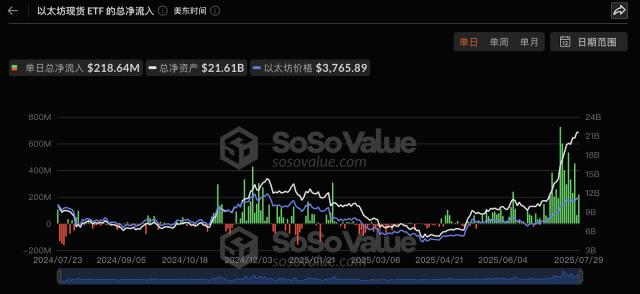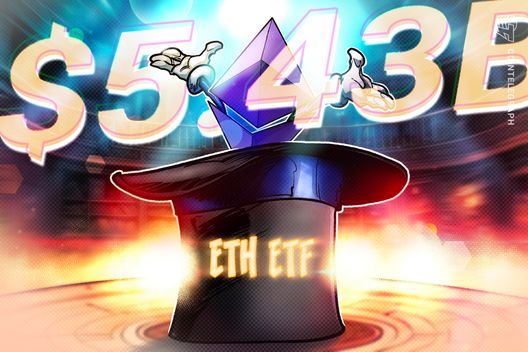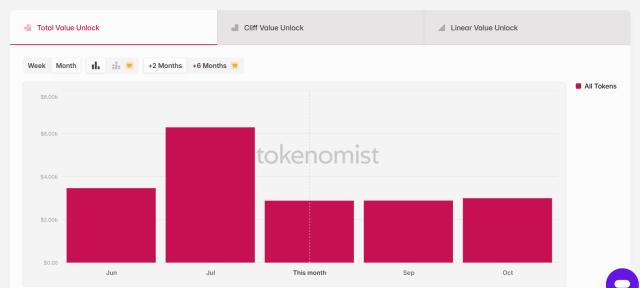Author: Ryan S. Gladwin
Translated by: Blockchain in Plain Language
Source: Shutterstock/Decrypt

Ethereum celebrated its 10th anniversary on Wednesday, marking a decade since its first block was born. So, what will the next ten years look like?
In its first decade, Ethereum has become the second-largest cryptocurrency by market cap, successfully navigated survival threats, and evolved in multiple ways.
What can we expect from Ethereum in the next ten years? Decrypt interviewed some top Ethereum experts to understand their predictions.

Next Five Years
Predictors from Myriad Markets believe there is a 64% chance that Ethereum will hit a new all-time high by the end of the year, which would be a great start to its second decade—especially considering that the current record has not been broken since 2021, while Bitcoin and other major cryptocurrencies have reached more recent highs.
Within this timeframe, the network is expected to undergo the Fusaka upgrade, with Bitwise senior research assistant Max Shannon estimating the upgrade will be launched in November this year. In the current draft, Fusaka will focus on data efficiency, accessibility, and user experience (UX).
According to the Ethereum roadmap, the Glamsterdam upgrade is expected to be launched in 2026. Victor Zhou, Ethereum Improvement Proposal (EIP) editor and Namefi founder, told Decrypt that the upgrade is still in the planning stage but will broadly enhance network capabilities.

"Ethereum L1 will continue to scale, aiming to achieve 10x expansion within the next 12 months," ConsenSys Chief Strategy Officer Jason Linehan told Decrypt. "This will complement the L2 expansion roadmap, with interoperability progress faster than ever before."
Hart Lambur, co-founder of Risk Labs—whose team developed the UMA oracle service and Across bridging protocol—told Decrypt that interoperability is key to its short-term future.
"Ethereum has achieved scaling through layer-two networks, but this breaks user experience; moving between different chains remains clumsy and expensive," Lambur said. "Solving interoperability is a major milestone ahead. Once interoperability becomes seamless, Ethereum will again feel like a unified network."
As the Ethereum ecosystem approaches interoperability, a series of network upgrades are waiting to be implemented to improve the base layer.
"In the next five years, upgrades like 'surge', 'purge', 'verge', 'scrape', and 'splurge' will bring cheaper transactions, faster processing, stronger MEV (maximum extractable value) protection, and simpler node operations," James Toledano, COO of Unity Wallet, told Decrypt. "While not as eye-catching as the merge, these changes address long-standing pain points."
Merge, surge, purge, verge, scrape, and splurge are loosely defined terms covering potential improvements Ethereum might undergo, according to TJ Keel, senior product strategy manager at ConsenSys. Toledano believes many of these improvements will take root in the next five years.
"Ethereum's first decade was about idealism," Zhou told Decrypt. "The next decade will be about adoption—bringing cryptocurrency to the masses."

Endgame
When Ethereum celebrates its 15th anniversary, experts believe institutional adoption will enter its third and fourth stages due to another series of upgrades.
Shannon, a researcher from Ethereum ETF provider Bitwise, predicts Ethereum will "complete danksharding, adopt verkle tree state commitments, and state expiry"—in layman's terms, this will reduce node hardware requirements and simplify the network.
Linehan added that ConsenSys's "goal" is to make zero-knowledge proofs part of Ethereum's base protocol. Shannon hopes such upgrades could unlock the use of on-chain digital IDs to prove "unique personhood" without revealing personal data.
"These structural upgrades should drive continued increases in on-chain throughput, institutional adoption, and tokenization of real-world assets," Shannon added.
In recent years, Ethereum's institutional adoption has significantly increased, with the US spot ETF passing—accumulating over $9.65 billion in inflows according to CoinGlass data. But many experts believe this is just the beginning.
"Ethereum has the potential to become the core infrastructure for global finance and digital coordination," Horizen Labs CEO Rob Viglione told Decrypt. "It's not hard to imagine ETH and stablecoins replacing many functions of SWIFT, CashApp, Venmo, Mastercard, and Visa, with tokenized assets trading around the clock on Ethereum-based rails."
For Lambur of Risk Labs, this will manifest as tokenization of "most assets"—think real-world assets, stocks, and bonds. He points out that BlackRock has already tokenized a fund on Ethereum, proving the network is moving in this direction. Lambur states that by doing so, Ethereum will become the "settlement and payment layer for all valuable things on the internet".
"A new generation of stakeholders will join—we believe, including some of the world's largest institutions—who will increasingly accept Ethereum as a public utility, the base layer of the future global economy," Linehan told Decrypt. "We see the power of such open systems when they reach a tipping point of global co-creation, like the internet, Web, Linux, etc."
"It will become the base layer of the future global economy," he added.
Zhou, Ethereum Improvement Proposal editor, added that standardization of smart contracts combined with real-world assets will be key to achieving this leap.
"The true endgame is simple: a massive payment and exchange network connecting every blockchain," he told Decrypt. "My craziest prediction might be that Ethereum becomes boring because it just operates as the settlement layer for everything."
Will Quantum Computing Ruin Everything?
Some experts believe quantum computing poses an "existential crisis" for major cryptocurrencies like Bitcoin, as the technology to crack on-chain encryption might emerge in less than a decade. However, Linehan says ConsenSys is not as concerned about the threat to Ethereum.
"We do not believe quantum computing poses a risk to Ethereum in the short term," Linehan told Decrypt. "But Ethereum is the most advanced in research and preparation for transition."
These research and preparations were initiated in a 2024 blog post by Vitalik Buterin, outlining potential cryptographic improvements through the aforementioned "splurge". Since then, Toledano from Unity Wallet says network builders have begun developing new quantum-resistant cryptographic solutions, trying to stay ahead of any potential threats.
"In short: it's a serious challenge for the future, but far from an existential threat," Toledano added.
If Ethereum can counter the quantum computing threat, improve user experience, and become the settlement layer for traditional finance, one expert believes it might ultimately surpass Bitcoin—currently five times Ethereum's market cap.
"If the user experience is in place, users will eventually realize this, as they always do, and Ethereum will win and surpass Bitcoin," said Amir Forouzani, co-founder of Ethereum infrastructure company Puffer Labs. "It is a better currency, it provides a platform where you can truly own and trust your currency. The flippening won't happen in one cycle, but it will ultimately happen."
Article link: https://www.hellobtc.com/kp/du/08/5992.html
Source: https://a.c1ns.cn/wxdhl







